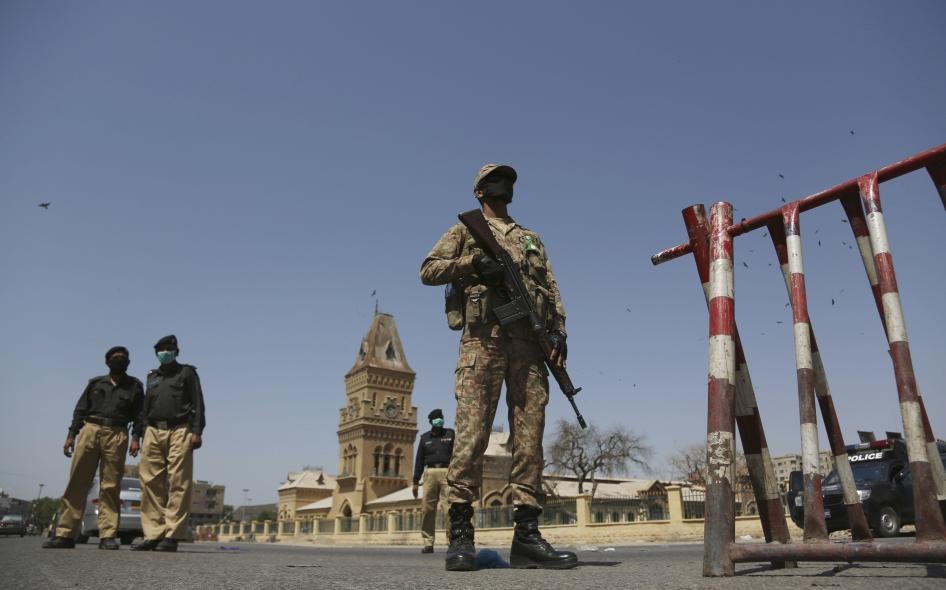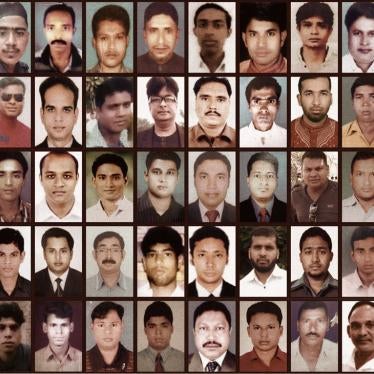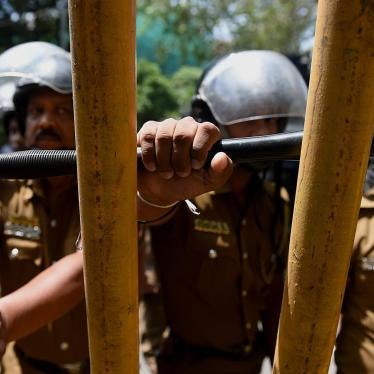(New York) – Pakistan’s Senate should urgently pass a bill that would make torture a criminal offense, Human Rights Watch said today. On August 1, 2022, the National Assembly passed the Torture and Custodial Death (Prevention and Punishment) Act, which, if enacted into law, will for the first time criminalize torture by Pakistan’s security forces. The bill has been sent to the standing committee and can be considered as early as in the next Senate session later in August.
While Pakistan’s Constitution prohibits the use of torture “for extracting evidence,” no domestic legislation makes committing torture a criminal offense. Pakistan is a party to core international human rights treaties that prohibit the use of torture and other ill-treatment and mandate parties to the treaty to criminalize the practice.
“The first step to ending Pakistan’s endemic torture problem is to criminalize it,” said John Sifton, Asia advocacy director at Human Rights Watch. “Justice and accountability in cases of torture will only be possible if parliament passes the torture bill and the government enforces the law by carrying out transparent and impartial investigations into torture allegations.”
Human Rights Watch has long documented the widespread use of torture and other ill-treatment by the Pakistani police during criminal investigations. Criminal suspects from marginalized groups are at particular risk of police abuse. Methods of torture include beatings with batons and littars (leather straps), stretching and crushing legs with roola (metal rods), sexual violence, prolonged sleep deprivation, and causing severe mental anguish, including by forcing detainees to watch other people being tortured.
In a widely publicized case in September 2019, Salahuddin Ayubi died in police custody after being arrested for theft. A forensic report confirmed that Ayubi, whose family said he had a mental health condition, had been severely beaten.
Police typically use torture to obtain confessions and other information from suspects, or to extract bribes from those in custody. Officials have claimed that the police resort to physical force because they are not trained in sophisticated methods of investigation and forensic analysis, but often police use torture to punish detainees and obtain quick confessions. In August 2019, the Punjab anti-corruption department discovered a cell run by police officers in Lahore where suspects were kept in secret detention and tortured.
Allegations of torture in political cases need to be investigated by authorities independently of the political interests of the governing authorities, Human Rights Watch said. During previous governments, there have been numerous credible allegations of torture and ill-treatment of political opponents or critics of the government.
The use of torture in political cases has received recent attention. Shahbaz Gill, a senior official with the opposition party Pakistan Tehrik-i-Insaaf (PTI), was arrested in Islamabad on August 9 on charges of sedition and incitement to mutiny after he said on a television program that junior military officers should not follow orders that are against public opinion. Pakistan’s sedition law, based on a colonial-era British provision, is vague and overbroad and has often been used against political opponents.
Gill’s lawyers and political party colleagues allege that Pakistani security officials beat and otherwise tortured Gill in custody. They also assert that he was denied medical treatment for his asthma condition. Pakistan government officials have denied the allegations. An immediate, independent, and transparent investigation into the allegations should be conducted, Human Rights Watch said.
Pakistan ratified the United Nations Convention against Torture and Other Cruel, Inhuman and Degrading Treatment or Punishment in 2010. Under articles 2 and 4, Pakistan is obligated to bring domestic law in line with the treaty. The UN Committee against Torture and the Human Rights Committee, in each of their Concluding Observations following Pakistan’s 2017 treaty reviews, urged Pakistan to make torture a criminal offense under Pakistani law.
Pakistan also pledged to criminalize torture as part of its candidacy in June 2020 for the UN Human Rights Council. In February 2020, the European Commission’s GSP+ assessment report for 2018-19, for the program that provides trade preference to eligible countries, said, “Pakistan’s legislation falls short of a law specifically defining torture and fails to explicitly criminalize torture as required under the Convention Against Torture.”
“By passing the torture bill, Pakistan will start a long-overdue process of reform to ensure that future allegations of torture are transparently investigated and that those responsible held accountable,” Sifton said.








